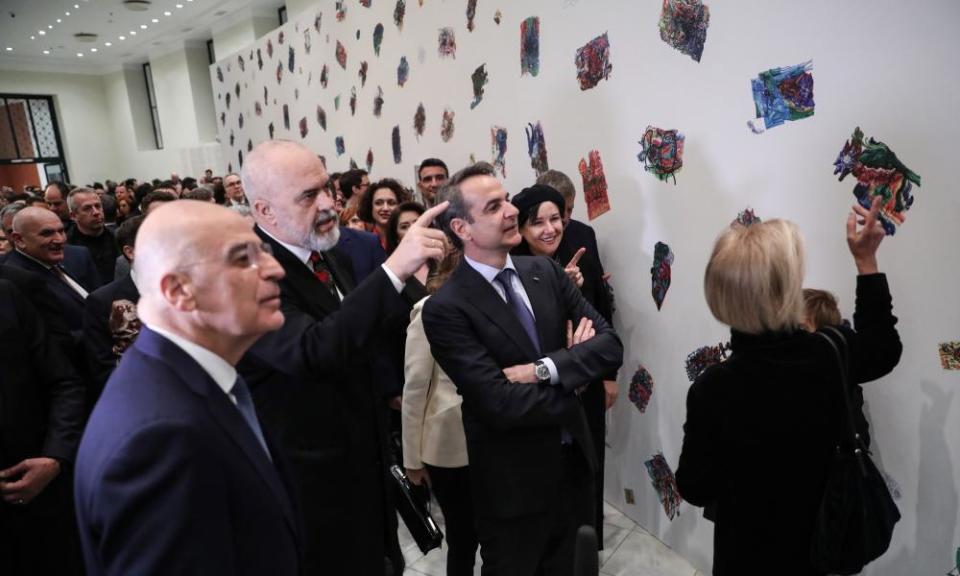Artist of the voting world: Albania’s PM Edi Rama mixes paint with politics
When Albania’s leader Edi Rama doodles in his prime ministerial office, he is consumed by what he calls his artistic spirit. The act of sketching over sheets of A4 sized paper, on used printouts, notes and protocols, not only comes naturally to a man who spent much of his early life teaching art, but also he says, helps keep him focused as he discusses matters of state.
It is a unique working style, feted in Athens this week where his first exhibition in Greece, Improvisations, was opened in the magisterial Zappeion by the country’s foreign minister and attended by his Greek counterpart, Kyriakos Mitsotakis.

“I feel much more like a painter, it’s true,” he said of his transition from visual artist to politician showing images of his art-strewn desk on his mobile phone. “I never imagined I would work in an office and not an atelier, but art followed me as I continued to doodle during my meetings.”
Rama, who had the facades of rundown buildings exuberantly painted as Tirana’s longtime mayor, is likely to bring the same spirit, contrarian and unconventional, to talks with Britain’s prime minister Rishi Sunak when on Thursday he becomes the first Albanian leader to visit 10 Downing Street.
“I will speak the language of truth,” the 58-year-old leader told the Guardian. “What we have seen and heard in Great Britain has been a disgrace, this singling out of a community and associating all Albanians with criminals.”
Rama’s unique style will, it is hoped, take the heat out of a meeting that is likely to be dominated not by diplomatic small talk but realpolitik at a time when Anglo-Albanian ties have been overshadowed by boat crossings, human trafficking and organised crime.
Dismantling stereotypes will be key, says Rama. The inflammatory rhetoric that senior members of the Tory government have indulged in, post-Brexit, had not only shocked many in his country but law-abiding, tax-paying Albanians – a community now thought to be 150,000 strong – across the UK.

The assertion of the home secretary, Suella Braverman, that England’s southern shores were being targeted by migrants – many young Albanian men – intent on staging “an invasion” had been especially upsetting.
“Unfortunately what we have heard was not just some sort of lapsus, things that came out of the mouth as a mistake,” he lamented. “Its part of a whole spirit that is totally on a collision course with the spirit of Great Britain, the Great Britain I have such respect for.”
More than ever, he insisted, it was important that “normal Albanians” were separated in the minds of policymakers and officials from the “rotten apples” involved in criminal networks.
“For some time we have been working, and fighting together, against criminal gangs that are not exclusively Albanian but international,” added the Albanian leader. “And we want to strengthen that collaboration but what is so disturbing is the association that is so often made between being Albanian and being criminal. Albanians obviously don’t control the Channel [sea]. That’s absurd.”
It is not lost on Rama, the son of a sculptor and a basketball player in his youth, that in Greece Albanians were once also stereotyped by a nation forced to cope with the arrival of tens of thousands of asylum seekers streaming across mountain passes with the collapse of communist rule. For years, the newcomers were described by local media as misfits and troublemakers and often equated with criminality. Three decades on, close to a million have made the country their home with officials describing the Albanian community as an integral part of Greek society.
Highlighting that point Athens’ foreign minister Nikos Dendias inaugurated Rama’s exhibition by saying the decision to host it in the Zappeion had been made because the government wanted to send “a strong and clear message” of friendship towards a neighbouring nation that, it hoped, would also soon become a member of the European Union.
“Our relations have changed dramatically,” said Rama describing how emotional it was to be driven in a motorcade to his own exhibition in a landmark building in Athens. “Albanians have flourished abroad. In the past people in your country, Britain, also migrated to Australia and America. People have the right to dream about something that is bigger and better. You can’t stop or prevent that. I was completely stunned when an MP actually asked why it was that people were crossing the channel in boats and not coming by plane. It was hard to believe when the truth is even government ministers in Albania encounter difficulties getting visas to the UK.”

 Yahoo News
Yahoo News 